| |||
All 102 seats in the Assembly 52 seats needed for a majority | |||
|---|---|---|---|
| |||
 |
|---|
Constituent Assembly elections were held in Albania in November and December 1923, [1] [2] with the second round taking place on 27 December. [3]
| |||
All 102 seats in the Assembly 52 seats needed for a majority | |||
|---|---|---|---|
| |||
 |
|---|
Constituent Assembly elections were held in Albania in November and December 1923, [1] [2] with the second round taking place on 27 December. [3]
During 1923 tensions had been building between religious groups, with Christians unhappy at former Ottoman officials continuing to take advantage of their position and taxes from the wealthier Christian parts of the country subsidising a government led by the Muslim Ahmet Zogu. [4] Following several political assassinations, in August Zogu agreed to a Constituent Assembly being elected later in the year. [4]
Zogu's faction won 44 seats and opposition candidates 39. The 19 independent candidates, most of whom were conservative, gave their support to Zogu, allowing him to form a government. [3]
However, opposition parties alleged there had been electoral fraud, claiming that their strong performance in the first round of voting should have led to them winning a majority in the second round. [3] The Dielli newspaper reported that the government had terrorised the electors into voting for their candidates. [3]
The new parliament convened for the first time on 21 January 1924. [5] Although Zogu was narrowly re-elected as Prime Minister, he resigned two weeks later, allowing Shefqet Vërlaci to become head of government. [4]
During classical antiquity, Albania was home to several Illyrian tribes such as the Ardiaei, Albanoi, Amantini, Enchele, Taulantii and many others, but also Thracian and Greek tribes, as well as several Greek colonies established on the Illyrian coast. In the 3rd century BC, the area was annexed by Rome and became part of the Roman provinces of Dalmatia, Macedonia and Moesia Superior. Afterwards, the territory remained under Roman and Byzantine control until the Slavic migrations of the 7th century. It was integrated into the Bulgarian Empire in the 9th century.
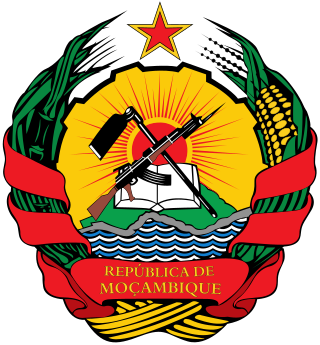
Politics in Mozambique takes place in a framework of a semi-presidential representative democratic republic, whereby the President of Mozambique is head of state and head of government in a multi-party system. Executive power is exercised by the government. Legislative power is vested in both the government and the Assembly of the Republic.
The Second Dáil was Dáil Éireann as it convened from 16 August 1921 until 8 June 1922. From 1919 to 1922, Dáil Éireann was the revolutionary parliament of the self-proclaimed Irish Republic. The Second Dáil consisted of members elected at the 1921 elections, but with only members of Sinn Féin taking their seats. On 7 January 1922, it ratified the Anglo-Irish Treaty by 64 votes to 57 which ended the War of Independence and led to the establishment of the Irish Free State on 6 December 1922.
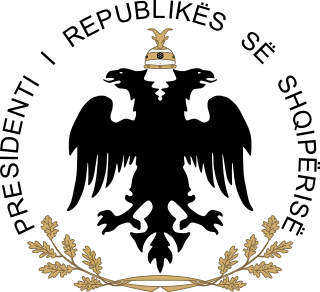
The president of Albania, officially styled the President of the Republic of Albania, is the head of state, commander-in-chief of the military and the representative of the unity of the Albanian people.
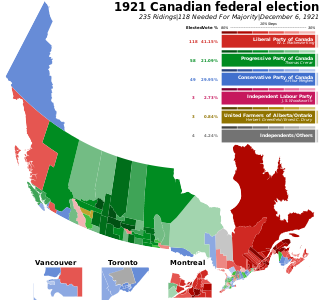
The 1921 Canadian federal election was held on December 6, 1921, to elect members of the House of Commons of Canada of the 14th Parliament of Canada. The Union government that had governed Canada through the First World War was defeated, and replaced by a Liberal government under the young leader William Lyon Mackenzie King. A new third party, the Progressive Party, won the second most seats in the election.

The National Assembly is the legislature for Venezuela that was first elected in 2000. It is a unicameral body made up of a variable number of members, who were elected by a "universal, direct, personal, and secret" vote partly by direct election in state-based voting districts, and partly on a state-based party-list proportional representation system. The number of seats is constant, each state and the Capital district elected three representatives plus the result of dividing the state population by 1.1% of the total population of the country. Three seats are reserved for representatives of Venezuela's indigenous peoples and elected separately by all citizens, not just those with indigenous backgrounds. For the 2010 to 2015 the number of seats was 165. All deputies serve five-year terms. The National Assembly meets in the Federal Legislative Palace in Venezuela's capital, Caracas.

Liberal Alliance of Montenegro was a Montenegrin separatist, liberal and anti-war political party, active between 1990 and 2005. The Liberal Alliance was a full member of the Liberal International from 1994 until the party's dissolution in 2005.
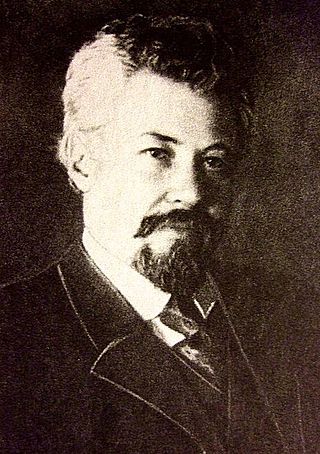
Elections to the Russian Constituent Assembly were held on 25 November 1917, although some districts had polling on alternate days, around two months after they were originally meant to occur, having been organized as a result of events in the February Revolution. They are generally recognised to be the first free elections in Russian history.
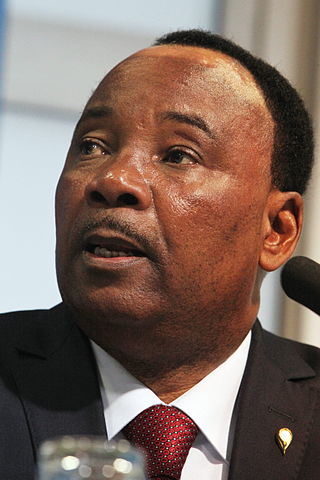
Mahamadou Issoufou is a Nigerien politician who served as the president of Niger from 7 April 2011 to 2 April 2021. Issoufou was the prime minister of Niger from 1993 to 1994, president of the National Assembly from 1995 to 1996, and he was a candidate in each presidential election from 1993 to 2016. He led the Nigerien Party for Democracy and Socialism (PNDS-Tarayya), a social democratic party, from its foundation in 1990 until his election as president in 2011. During the presidency of Mamadou Tandja (1999–2010), Issoufou was the main opposition leader.

The Parliament of Albania or Kuvendi is the unicameral representative body of the citizens of the Republic of Albania; it is Albania's legislature. The Parliament is composed of no less than 140 members elected to a four-year term on the basis of direct, universal, periodic and equal suffrage by secret ballot. The Parliament is presided over by the Speaker, who is assisted by at least one deputy speaker. The electoral system is based on party-list proportional representation. There are 12 multi-seat constituencies, corresponding to the country's counties.

Constituent Assembly elections were held in Nepal on 10 April 2008, having been postponed from earlier dates of 7 June 2007 and 22 November 2007. The Constituent Assembly was planned to draft a new constitution and therefore decide, amongst other things, on the issue of federalism. The number of eligible voters was around 17.5 million. The Constituent Assembly was originally set to have a term of two years.

The Albanian Kingdom was the official name of Albania between 1928 and 1939. Albania was declared a monarchy by the Constituent Assembly, and President Ahmet Bej Zogu was declared King Zog I. The kingdom was supported by the fascist regime in Italy, and the two countries maintained close relations until Italy's sudden invasion of the country in 1939. Zog fled into exile and never saw his country again. The Communist Party of Labor of Albania gained control of the country toward the end of World War II, established a communist government, and formally deposed Zog.

The Principality of Albania was a short-lived monarchy in Albania, headed by Wilhelm, Prince of Albania, that lasted from the Treaty of London of 1913 which ended the First Balkan War, through the invasions of Albania during World War I and the subsequent disputes over Albanian independence during the Paris Peace Conference of 1919, until 1925, when the monarchy was abolished and the Albanian Republic declared.
Parliamentary elections for a Constituent Assembly were held in Albania on 2 December 1945. Voters were presented with a single list from the Democratic Front, organized and led by the Communist Party of Albania. The Front won all 82 seats.
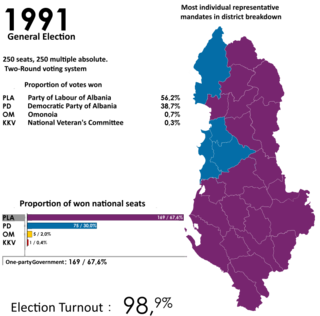
Constitutional Assembly elections were held in the People's Socialist Republic of Albania on 31 March 1991, with later rounds on 7 April and 14 April. They were the first multi-party elections since 1923, and were held after the formation of new political parties was legalised on 11 December 1990 following a strike by 700 students at the University of Tirana over poor dormitory conditions and a power failure, which subsequently became politicised under the influence of Sali Berisha.
Indirect presidential elections were held in Albania on 30 May, 4, 8 and 11 June 2012, the seventh such elections since the collapse of the communist regime in 1991. The first through third rounds of voting were inconclusive. The fourth round resulted in the incumbent party's member Bujar Nishani being elected as President.
Parliamentary elections were held in Lithuania on 10 and 11 October 1922, electing 78 members of the First Seimas. They were the first elections held in Lithuania under the 1922 constitution, which had been adopted by the Constituent Assembly on 1 August 1922.

Presidential elections were held in North Macedonia in 2019. Three candidates were on the ballot in the first round, held on 21 April: Stevo Pendarovski, supported by the ruling coalition led by the Social Democratic Union of Macedonia, including the Democratic Union for Integration; Gordana Siljanovska-Davkova of the leading opposition party VMRO-DPMNE, and Blerim Reka, an independent supported by Albanian opposition parties Alliance for Albanians and Besa Movement. The first round did not result in an absolute majority for any candidate, with Pendarovski receiving the most votes. In the second round held on 5 May, Pendarovski defeated Siljanovska-Davkova with 54% of the vote.

General elections were held in Namibia on 27 November 2019. Ballots were cast using electronic voting. A total of eleven candidates ran for the presidency and fifteen political parties contested the National Assembly elections.

The June Revolution also known as the Antibourgeois Democratic Revolution was a peasant revolt backed by the parliamentary opposition to the Zogu government, following the 1923 Albanian parliamentary election.